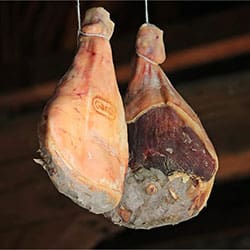Here, “vitamin T” stands for tacos and other kinds of traditional Mexican cuisine. They call traditional food “vitamin T” because the names of so many of the dishes start with T. And while vitamins typically are nutrients we get from fruits or vegetables to maintain our health, Mexico’s vitamin T is not that kind of vitamin at all. The nutrition you get from Mexican vitamin T is getting fat.

Tacos at a café in Monterrey
The main vitamin T dishes are tacos, tortillas, tamales, tortas (like Mexican sandwiches), tostadas (fried tortillas), and totopos (fried tortilla chips, usually triangular in shape).
All of them are an essential part of the Mexican diet. Although they aren’t as common in Monterrey, street stalls serving tacos and tortas line the streets in Mexico City, and the lively lunchtime crowds are always a sight to see. All the vitamin T foods are delicious, but you’ve got to be careful not to eat too much of them because they’re high in calories. Even if you order pozole or some other kind of soup, for example, it will come with totopos—and there goes your healthy meal. Tamales in particular are packed with calories. They’re made by mixing cornmeal with lard, wrapping it (in a banana leaf, for example), and steaming it. A lot of the street stalls in Mexico sell them as a breakfast food.
The frequency with which people eat vitamin T foods correlates with socioeconomic status. The dishes are relatively cheap—even cheaper if you get them at a street stall. They’re also considered traditional Mexican cuisine, so it’s customary for people to eat them. Those who are a little better off typically pay more attention to health and their physique, making it a point to eat vegetable-rich salads or drink fresh fruit juice rather than eat vitamin T foods all the time. Japanese food is also popular with these groups from a health standpoint. But healthier food tends to be pricier, so in a country with a large economic gap like Mexico, the reality is that most people only eat food that delivers a lot of calories at low cost.
The whole concept of “vitamin T” plays into the fact that Mexico is the fattest country in the world. It also consumes more Coca Cola than any other country. A lot of people drink Coca Cola or other sodas with meals instead of water. First of all, it’s cheap. You also have to buy water if you want to drink it, and there’s almost no food education here. They don’t focus on nutrition at home or in schools like we do in Japan, nor can you drink water out of the tap everywhere or get purified water for free at restaurants. There’s less economic inequality in Japan too. So what we think should be obvious in Japan may not be in other places.
Obesity has been recognized as a severe problem in Mexico in recent years, among children as well as adults. The country has taken several measures to combat this trend, taxing sugary drinks and high-calorie foods, prohibiting the use of cute animals or characters on packaging, and affixing special labels to foods that are high in salt, sugar, or calories.

A Coca Cola bottle with a label recommending that kids do not consume it because it contains sweeteners and caffeine, in addition to having excess sugar and being high in calories

Food labels on seasonings

Food labels on snacks come with tons of warnings as well
I’ve heard that some schools have even prohibited the selling of snacks, but it seems like most of them are still doing it as usual. A higher percentage of wealthier parents who send their kids to private schools are concerned, so apparently those schools are restricting or prohibiting snack sales. They’ve even prohibited the sale of sugary drinks and snacks to minors in the state of Oaxaca. Other states are following suit, so similar legislation is becoming more widespread, but there are questions as to whether a rule that prevents kids from buying things they’re going to eat at home anyway will have much effect. Still, maybe trying out various measures will gradually make people realize how urgent a national problem obesity is and make it more natural to pay attention to what they’re eating on a daily basis.






























































